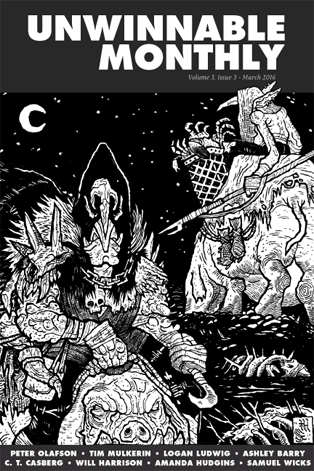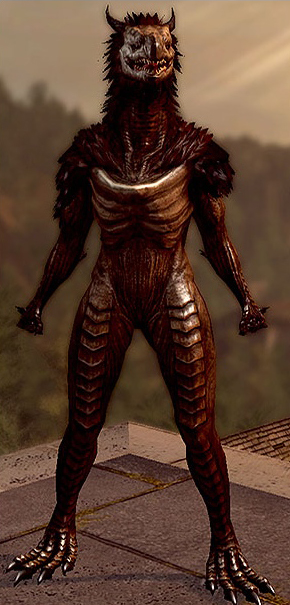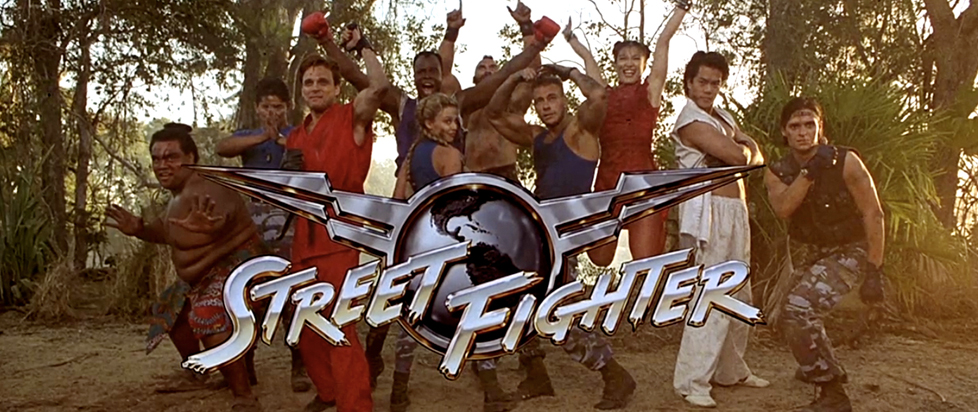
My Inner Scales
 The following is a reprint from the Variations section of Unwinnable Monthly Issue Seventy-Seven. If you enjoy what you read, please consider purchasing the issue or subscribing.
The following is a reprint from the Variations section of Unwinnable Monthly Issue Seventy-Seven. If you enjoy what you read, please consider purchasing the issue or subscribing.
———
How had it happened? Had one of those roaming, tittering knights given me a tip? Had I binged on my bottle of Estus and stumbled my way there? Maybe everything beforehand was a dream and I’d lived here all my life – in the spacious underside of an archtree, swimming with voids and woody tangles – subsisting on moss, faint veins of moisture and flights of fancy. I knew the last possibility wasn’t true, but…what was I looking for anymore? For the first time since I’d put it on, I took the eye-holed sack (donated by a deceased mad butcher) off of my head and sat down next to the feeble bonfire. My temples burned. If I looked ahead, I only saw bark walls; and if I looked below, an arboreal abyss. Branches and roots, many wide and sturdy enough to be descended on, swirled into an apparently baseless depth. Nothing but a great hollow.
I sure as hell didn’t want to go back, not into that browned swamp and cantilevered mess of planks masquerading as a town. The only way out of that shithole was up, up a stack of creaking ladders and boardwalks – and after finding a place free of mosquitoes and hissing ghouls, I wasn’t in any hurry to attempt that climb. Besides, I was in a weird headspace. Who needs the upper world? a voice asked with increasing clarity. Who needs prophecies or valor? It’s all one big annoyance. No, it went on, go deeper. Drink the earth. Bow your head. Seek tunnels. After sleeping once in fits and waking to the same bluish glow filtering down from way above, I took to those roots and branches. One shuffle-step at a time. Brittle twigs sticking from nearby boughs scattered like desiccated spiders when my body brushed against them.
The descent wasn’t particularly long, but it was slow, and I was compelled to take breaks along the way. My body still suffered from some sort of sickness – a mild fever, maybe. Every now and again I caught sight of a humanoid corpse curled up on a bough or slumped in a nook. Each was nearly the color of bark and moss. Rejects from some gutter-burg who’d entered this purgatory and either couldn’t escape or didn’t want to. To another person, these corpses might be harborers of valuables. To me, they were reminders of how many borders were in this Land of the Ancient Lords: borders to keep the undesirables out as the privileged went about their business – or did, before they hollowed as well. Reminders of how much more fractured and stratified every place had become since the breakout of the Darksign. Of course, I’d drawn my own line between myself and others by going – escaping – into the archtree.
Any clear measurements of time had gone out the window with my bird-borne arrival – the spots where its claws had held onto me still ached – at Lordran. Standing under a blue enamel or velvet voidscape just depended on where you were. But to lose sight of the sky in the bowels of this archtree was a real fuck-up. I was thankful for the few surprises that helped to divide the journey in ways aside from tiers of woody limbs. A company of basilisks had made an alcove their home and lazed about its floor. Someone, or something, had strung together a thin fixed ladder and propped it against one of the hollow’s sides where there was an absence of boughs. Enormous rosy fungi, large enough to be used as steps, grew out of the hollow’s lower body.
A tunnel followed this fungal procession. There, with a barrel vault of bark over my head, I heard the sighing laps of waves. When I rounded a bend, a haze of blue-green light, like the color of an ocean in a dream, flushed through a portal. I stepped out and onto the slope of a massive root. Facing me was an eternity of inky water: clean, pure, impenetrable. Trunks of archtrees, dozens, uncountable, rose from its surface and lined the horizon like sentries. Their tops disappeared among a wrinkled roof of clouds. My knees buckled. Yet stranger than all of this was the vague, terrifying, riveting sense that, here, I was returning to a native land. Here, I’d satisfy an unknown longing. To my right was a sheer drop into water, and to my left was the rest of the root. It slid onto a sizable mound of gray sand, and this continued as a sandbar which snaked into a distant grove of archtree roots. I took a sniff of the air. No, not sand – ash.
I don’t need to damn anyone to sleep with recountings of the time I spent on this ashbar. Suffice it to say that my supply of Estus dwindled and by then the only thing equal to my lust for some sort of material overflow to satiate my ugly body was my indecision: to retreat back up the archtree’s hollow, to wither away under the turquoise sky, or to follow the trail of ash to its end, and there find the source of an invisible calling.
In the end, I made for that grove. My sickness had lifted, replaced by a fever of the mind. Moss-caked roots welcomed me into the grove, and twisted up into a blue light, like giant petrified snakes. My stomach churned and my heart trembled. At the ashbar’s end, on the top of a gray hill, settled in a great nest of spindly branches and resting under the hood of its own four craggy wings, was an ancient dragon.
Even before I’d gotten closer – even before the dragon spread its wings and revealed itself in all its tufted and ribbed resplendence – even before everything that transpired afterwards – I knew that I was in the presence of a being to whom I’d pledge my loyalty. Such an inscrutable mind: neither benevolent nor severe nor wild. I felt as if, were I to slay the dragon merely for the fact of its otherness, it would accept its death with sorrow and detachment. Distant as the nightlights, grounded as the archtree, the dragon provoked a latent yearning — to cast aside humanity and its attendant bullshit, shed my skin in favor of scales, and seek the company of others in this shadow-strewn land who were similarly compelled. I knelt on that hill, bowed my head, lifted up a pair of cupped hands, and offered my devotion to the dragon and dragonhood.

Although I’ve been playing videogames for about two decades, roleplaying in them isn’t something I’ve done or thought about that much. Most of the time, avatars have been flavorless conduits to engage a world, like a tool applying itself to a machine. People often talk about how Crono’s silence in Chrono Trigger or the first-person perspective in Half-Life are devices for the player to insert their own psychology. For me, those are design decisions with no personal resonance. I can’t and don’t want to embody Gordon Freeman because I don’t find in Freeman anything I want to embody, nor is his world one I want to romance with my imagination.
The Legend of Zelda: Ocarina of Time was where I first felt some deeper – and, at the time, unexplainable – connection to a character when the protagonist, Link, was sent into a magical slumber and awoke as an androgynous teenager. Somehow, it was exciting to be a beautiful young man. This carried over to an interest in the Castlevania series’ latter protagonists who were, nearly without exception, men with long eyelashes, placid lips and cascading hair. Each recalled Donatello’s statue of David, who cocks a hip to one side and holds a sword half the length (and maybe half the weight) of his lithe body. This was a bit hard to appreciate in most of the actual games, since the characters were reduced to bunches of pixels, so most of the appreciating was done through Ayami Kojima’s manga-meets-baroque official art.
Dark Souls was where I found a virtual space to consciously roleplay on a deeply fulfilling level. It drew out a part of myself that I didn’t know existed, like Ocarina of Time and those Castlevania titles, but it did so at an opportune point – when I was connecting to a wider range of people while discovering more of myself – and offered both an obsession-inducing world and a dramatically secret, alternative and weird way of fitting into that world.
Dark Souls has what it calls covenants: joinable factions, each with its own figurehead (sometimes just an altar), allegiances, ranks, rewards and requirements for acquiring the latter two. Join the popular Forest Hunter covenant, for example, and you’ll get a ring. This allows you to invade the worlds of players who trespass into the Darkroot Garden with the intent of desecrating a knight’s grave.
 Among all of these covenants, the most special is the Path of the Dragon. To even get to it, you need to hack down an illusory wall in an obscure corner of the world and then traverse two whole environments: the Great Hollow and Ash Lake. Both of these practically exist just to lead up to the covenant’s leader, the Stone Dragon. Pledge your allegiance and you receive a Dragon Eye and Dragon Head Stone. The former lets you seek out fellow covenant members to fight them (win a duel and you get a dragon scale), while the latter transforms your head into a dragon’s, complete with fire-breathing action. If you offer enough dragon scales, the dragon grants you a Dragon Torso Stone so that you can fully transform into a dragonoid.
Among all of these covenants, the most special is the Path of the Dragon. To even get to it, you need to hack down an illusory wall in an obscure corner of the world and then traverse two whole environments: the Great Hollow and Ash Lake. Both of these practically exist just to lead up to the covenant’s leader, the Stone Dragon. Pledge your allegiance and you receive a Dragon Eye and Dragon Head Stone. The former lets you seek out fellow covenant members to fight them (win a duel and you get a dragon scale), while the latter transforms your head into a dragon’s, complete with fire-breathing action. If you offer enough dragon scales, the dragon grants you a Dragon Torso Stone so that you can fully transform into a dragonoid.
What draws me to the Path of the Dragon are its symbolic implications, rather than what’s literally presented by the game. There’s nothing outright saying that the Path of the Dragon is special, but you can intuit this by how hidden it is, and also by the fact that none of the other covenants offer a change to your body’s fundamental makeup. Just think about how Dark Souls is a videogame that’s most well-known for its difficulty, and how here is an in-game option to semi-permanently negate your armor (should you die, you’re reborn as a human). In fact, fully transforming with the Dragon Torso Stone is impossible until you’ve manually removed your garments. Becoming a dragonoid, in effect, is a statement. Perhaps it’s a declaration of confidence in your abilities; or an outer reflection of trying to attain an inner state of wild ecstasy; or maybe it’s a way of setting yourself apart from the majority of players. It’s been four years since Dark Souls’ release and it’s still very rare to run across other dragonoids, but when it happens there’s a spark, a strange sense of conviviality – like reuniting with a friend in a dream.
It’s important to remember that, in Dark Souls’ world, “humanity” is a material commodity and an existential condition. Both are considered precious by a society that’s fallen victim to entropy. Choosing to be a dragonoid is more than a way of setting yourself apart from the playerbase; it’s also a rejection of a fictional standard. You’re turning away from a humanity-lusting world and opting for an alternative ideal – an ideal that’s only ever physically partial (after all, you’re a dragonoid, not a dragon), but present as an evolving idea, a comprehension of your identity.
And like any fictional standard, lines can be drawn from this to reality. Joining the Path of the Dragon covenant and transitioning to dragonhood could be described as a form of rebellion. One of the primary reasons humans could prosper as they did in Dark Souls’ mythology is because the earth’s original inhabitants, the dragons, were nearly wiped out in an ancient genocidal war. As a dragonoid, you are, to some degree, contesting humanity’s lineage and empathizing with what your written history has seen as worthy of elimination. Out of all our real-world examples, I’m reminded of the Adonia festival in Athens, wherein Athenian women celebrated the mythological love affair of Aphrodite and Adonis, and reenacted the latter’s death and burial. Adonis’ sensitivity and kindness as a lover was, as Eva Keuls writes in her book, The Reign of the Phallus, “a counter-cultural male sex symbol, the antipode of the male model canonized by society and embodied by Heracles and Theseus, brawny, aggressive strong-men.” When women stood atop roofs during the Adonia and bewailed Adonis’ death, they were, for one small window of time, bewailing their persecution by patriarchy through a mythological embodiment.
It’s already been observed countless times that videogames are spaces for performing alternative identities; it’s all the more meaningful when alternatives within that alternative itself are allowed. So what part of myself that I didn’t know existed does being a dragonoid draw out? Well – I don’t exactly know. My best guess is that there’s some connection between assuming an alternative identity in a meaningful work of fiction and my increasing resistance to how society has told, and still tells me, I should conduct myself according to my gender. But that lack of knowledge is kind of exciting. It means that there’s room for growth in both how I understand myself and my imaginative relationship to Dark Souls. For now, I’ll continue to seek fellow scale-wearers and feel a mysterious thrill when we roar under a full moon.
———
Ario Elami is a Boston-based visual artist, author and composer who has inordinately strong opinions about architecture. His favorite insect is the cicada. Follow him on Twitter @Doshmanziari




